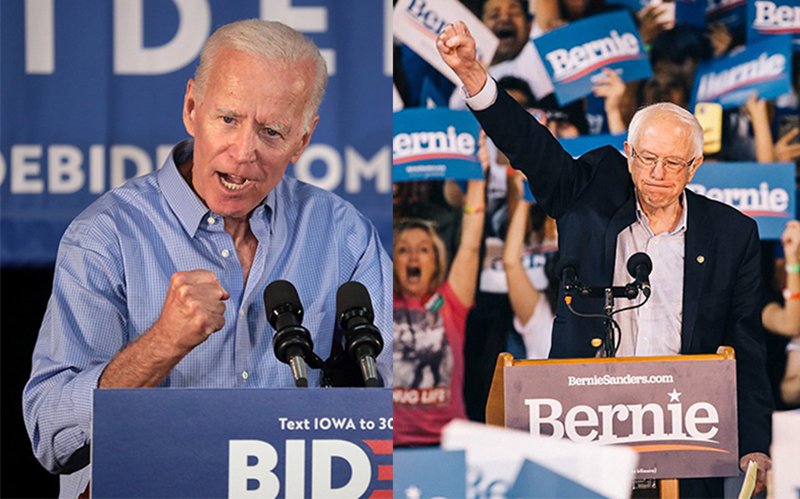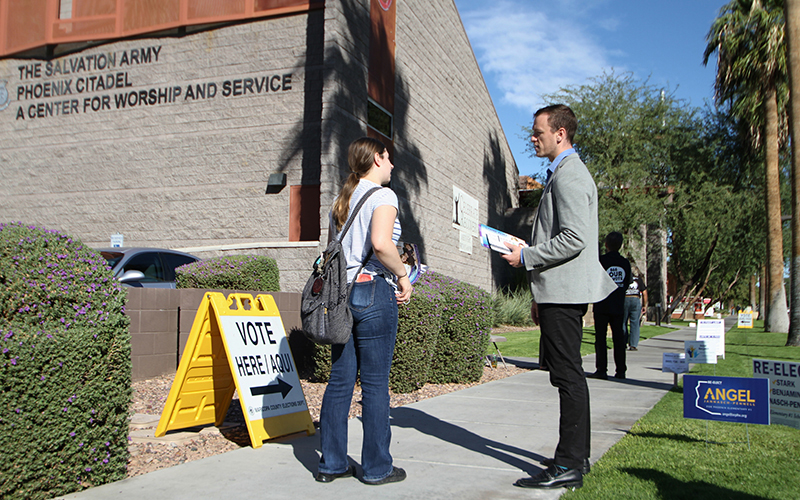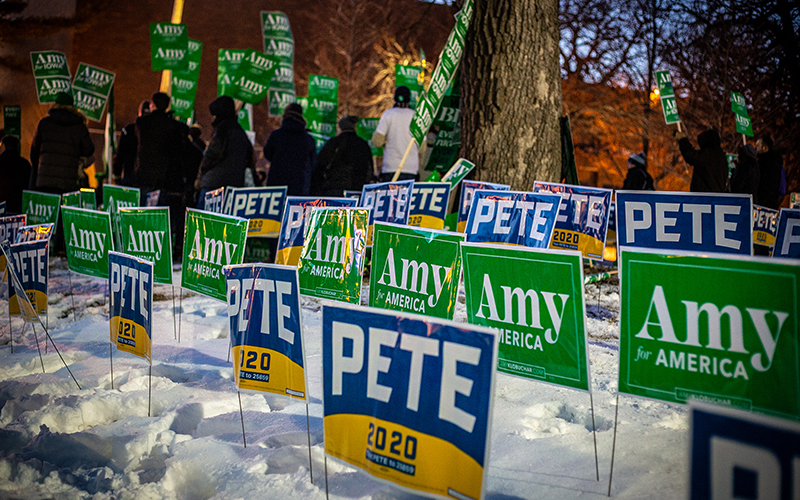
Former Vice President Joe Biden, left, was leading Vermont Sen. Bernie Sanders in polls in Arizona as voting opened in Tuesday’s presidential preference primary. Biden was declared the winner in Florida and Illinois Tuesday, continuing a remarkable resurgence in his campaign. (Biden photo by Gage Skidmore/Creative Commons | Sanders photo by Michael Hannan/Cronkite News)
WASHINGTON – Former Vice President Joe Biden was soundly beating Vermont Sen. Bernie Sanders in early returns from Arizona’s presidential preference election Tuesday, according to preliminary returns from the Arizona Secretary of State’s office.
Two hours after the polls closed, Biden had 213,964 votes to Sanders’ 151,066, a margin of 42.6% to 30.1% of the ballots counted at that point. Massachusetts Sen. Elizabeth Warren and former South Bend, Indiana, Mayor Pete Buttigieg, who dropped out of the race earlier this month, were a distant third and fourth, respectively, with 6.9% and 4.9% of the vote.
The Arizona results were part of an apparent sweep for the resurgent Biden campaign, which cruised to apparent comfortable victories in Florida and Illinois earlier in the evening.
Margins in those states were even wider than in Arizona: With just under 99% of precincts in Florida counted, Biden led Sanders with 61.9% to 22.8% of the vote, according to the Florida Secretary of State’s office, while the New York Times gave Biden a 59-36% edge with 98% of Illinois precincts counted.
Biden entered the day a heavy favorite to win the bulk of the 67 delegates at stake in Arizona, and various reports estimated he would take 26 delegates to Sanders’ 22. His other victories Tuesday would give him a total of 249 delegates to Sanders’ 116, according to an NPR tracker, out of the 441 delegates available.
Sanders campaign manager Faiz Shakir said after the primaries that Sanders “is going to be having conversations with supporters to assess his campaign.” But with three weeks to the next primary, he said, Sanders would be focused on the government’s response to the coronavirus.
Biden, meanwhile, sounded a conciliatory tone in an election night videotaped at his Wilmington, Delaware, home.
“Senator Sanders and I may disagree on tactics, but we share a common vision. For the need to provide affordable health care for all Americans, reducing common equity that has risen so drastically, to tackling the existential threat of our time, climate change,” Biden said, before praising the enthusiasm of Sanders’ supporters.
“My goal as a candidate for president is to unify this party and then to unify the nation,” he said. “It’s moments like these where we realize we need to put politics aside and work together as Americans.”
Biden’s apparent victory was driven by heavy early voting and a steady stream of voters Tuesday at polling places in Arizona. Even before the polls opened, interest in the primary was heavy in Arizona, with the state Democratic Party reporting that about 480,000 early ballots had been returned, more than all the Democratic primary ballots cast in the 2016 presidential preference primary.
It’s not clear how many of those early ballots would go to the two remaining candidates, with 12 Democrats still on the ballot who later pulled out. Besides candidates like Buttigieg and Warren, the ballot included Minnesota Sen. Amy Klobuchar and former New York City Mayor Mike Bloomberg, whose votes were not included in Tuesday’s tallies because they formally ended their campaigns, rather than just suspending them.
But Paul Bentz, senior vice president of research and strategy at HighGround, said that even with some votes going to former candidates, he expected a “handy victory” for Biden.
An average of polls Tuesday morning by FiveThirtyEight gave Biden 51.6% of the primary vote in Arizona to Sanders’ 26.9%. Bentz said a surge in ballots after Super Tuesday, when much of the Democratic field dropped out, are “more than likely to break Biden’s way.”
Mike Noble, chief of research of OH Predictive Insights, said earlier Tuesday that for him it was not a question of whether Biden will win, but how much. He said it is only a matter of time before Sanders will drop out as the “pressure will continue to mount after each election.”
“What we’re seeing right now is that the raw total number of voters is higher than 2016 … and turnout for this election will be right around 50%,” Noble said.
Biden entered the day with 898 delegates of the 1,991 he needs to clinch the nomination, and ended Tuesday with 1,147 delegates and Sanders at 861 delegates, according to a tally by the New York Times.
Despite fears that the novel coronavirus might affect turnout – and the fact that Maricopa County cut its polling locations from 229 to 148 to cope with the fast moving virus – turnout appeared to be good and voters reported a positive experience at the polls Tuesday, Arizona Democratic Party spokesman Matt Grodsky said.
Rheanna Schmidt voted early Tuesday at a West Valley location and said there were more polling volunteers than people voting, but the process was smooth and quick because she had the proper identification.
But Schmidt said “I’d be lying,” if she claimed she wasn’t worried about voting amid the COVID-19 pandemic.
“There’s been some talk recently that this coronavirus situation is kind of our generation’s World War II and it is a big situation that we’re having to deal with,” Schmidt said. “It was important to me to vote because … I made a commitment to my grandfather who was in World War II that I would always vote.”
Bentz said closed polls could lead to voter confusion but “because we have vote-by-mail, we were able to successfully conduct an election and ensure that the majority of those who wanted to vote were able to have their voice heard.”
The roughly 480,000 early ballots cast in this election represent about 39% of the state’s registered Democrats, according to a statement from the Arizona Democratic Party.
The race was much more crowded until a few weeks ago when Biden, who had been trailing in early states, staged a rout in South Carolina. That was followed by strong showings on Super Tuesday, when voters in 14 states went to the polls.
Within days, once-prominent Democratic hopefuls, including Buttigieg, Klobuchar, Bloomberg and Warren, dropped out of the race. Buttigieg, Klobuchar and Bloomberg quickly endorsed Biden, along with California Sen. Kamala Harris and New Jersey Sen. Cory Booker, two other presidential hopefuls who had dropped out earlier.
Endorsements in Arizona followed, from Sen. Kyrsten Sinema and Phoenix Rep. Ruben Gallego, D-Phoenix. Rep. Greg Stanton, D-Phoenix, said he voted for Biden by mail two weeks ago.
“Biden is the strongest candidate to really unite this country, Republicans and Democrats around our common values and a common vision for the future of America,” Stanton said Tuesday.
He believes Biden has the best chance of defeating President Donald Trump while allowing down-ticket Democrats to make gains in the House and Senate.


